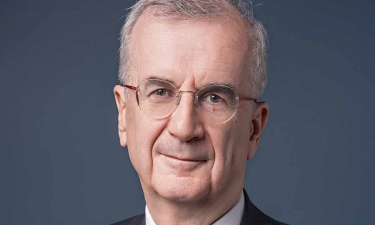- Home
- Governor's speeches
- Central banks and the unleashing of Euro...
Central banks and the unleashing of European growth

François Villeroy de Galhau, Governor of the Banque de France
Published on 22nd of November 2024

Frankfurt European Banking Congress, 22 November 2024
Speech by François Villeroy de Galhau,
Governor of the Banque de France
Ladies and Gentlemen, Liebe Freunde,
I am delighted to be with you today at the 2024 Frankfurt European Banking Congress, especially for this joint session with my Bundesbank colleague and friend Joachim Nagel. Europe obviously has a growth problem. Recent trends were already set to widen the gapi while since 1999, GDP per capita growth has been slower in the euro area (+26% vs +39% in the US). A significant part of the gap is due to the last five years: since 2019 and Covid, GDP per capita only increased by 2.5% in the euro area compared with 7.9% in the US. The outcome of the US election must obviously serve as another wake-up call. The future US economic policy is still uncertain in its details, but not in its probable direction: more tariffs, more fiscal deficits, less regulation including in finance. And this could mean more risks for the global economy: more inflation – especially in the US –, more financial volatility, less trade and hence less growth including for Europe. Joachim and I nevertheless believe that Europe still has the levers to master its economic destiny and strengthen its growth: this is why we will issue today a common call. But let me first dispel three common misconceptions regarding Central banks and growth.
“Central banks don’t care about growth”
True, our primary objective is and should remain price stability. We are clearly in the process of reining in inflation, which stood at 1.7% in September and 2.0% in October in the euro area, down from a peak of 10.6% two years earlier. This sharp decrease clearly warranted the third rate cut in October.ii Despite possible ups and downs over coming months, we are very confident that we will sustainably reach our 2% target. We should even get there earlier than expected in 2025 compared with our September forecasts.iii
Our past monetary tightening has neither caused a recession in the euro area as a whole, nor substantially raised unemployment which remains at its historical low (6.3% for the euro area). In short, the European economy is achieving a soft landing largely thanks to central banks’ credibility.iv Price stability is a necessary condition for trust, and hence for growth. We are not behind the curve today, and looking forward, we will determine the pace of our further monetary easing in a pragmatic way, and following a data-driven and meeting-by-meeting approach, as President Lagarde stressed.v We are confident that victory against inflation is in sight, but we will pay close attention to the balance of risks and to its symmetry, including the possible risk of undershooting our inflation target, and of keeping economic activity unnecessarily subdued.
“Today, reviving growth is contingent on fiscal stimulus”
I will not make any comments about German fiscal policy: it’s a different and specific case, and I am aware how acute the political debate is. But let me speak about most other European countries, including my own. Fiscal policies have responded to the recent series of crises – Covid and the Russian war in Ukraine – by providing strong support. Many countries now face high debt levels, with an average of roughly 88% of GDP in the euro area as of mid-2024.vi Meanwhile, the effects on activity of persistent fiscal deficits have overall proved disappointing over the long term and still more in France, Spain and Italy. Indeed, when public debt is too high, Keynesian effects of stimulus on aggregate demand are dampened by consumers’ expectations that such measures will have to be paid back in the future through higher levies, and more generally their fear of uncertainty. It probably helps explain why the euro area savings rate still recently increased, from 13.1% to 15.7% between the end of the second quarters of 2022 and 2024; and why consumption has hence so far remained more sluggish than expected, even though households’ real disposable income has risen.
Notwithstanding the specific German situation, all these elements point in the same direction: in many countries fiscal consolidation is needed, and now is a good time to do so. Let me by the way stress a misunderstanding about Eurobonds and common public funding of investments in the Draghi report:vii as a non-starter for Germany and other Member States at this stage, it can be disconnected from the other report’s recommendations. Let us at this stage focus positively on these recommendations, which are numerous, decisive and costless. Mario Draghi himself gave no figures, and pointed out that “it’s not the main thing of the report”.viii But shared private funding, through the Savings and Investment Union, is of the essence. As emphasised by Gita Gopinath, First Deputy Managing Director of the IMF, most governments need to undertake a “strategic pivot” ( ) and focus their efforts on structural policies to meet the major challenges of growth in the coming years.
“Central banks should only talk about monetary policy”
Should central banks only talk about monetary policy? Actually not, for several reasons. In Europe – including at the Bundesbank and the Banque de France –, there is a long tradition of central banks freely providing their expertise on economic topics other than those strictly related to inflation or interest rates. Thanks to the Deutsche Bundesbank, independence is a German heritage, which I cherish, and it is a great chance to have central banks’ independent expertise. In today’s world where supply shocks are decisive and will be more and more frequent,x promoting structural policies is still more essential and in the interest of price stability. As central bankers, we are not the decision-makers here, this is up to governments. But it is our duty to help keep supply-side reforms at centre stage, all the more so since political authorities are at present often weakened, as they are unfortunately more subject to strong short-term and domestic pressures.
Central banks have built their credibility on monetary policy through decades of tenacious action and communication. They must now sometimes use this credibility to call beyond monetary policy, as price stability and financial stability will also depend on broader economic levers. If we do not defend open trade, with fair rules, who will? Or if we do not plead for more financial integration in Europe, who will?
This is why Joachim Nagel and I want to issue now, here in Frankfurt, a common call. By doing so, we also echo Konrad Adenauer, who was Chancellor from 1949 to 1963: “When everybody else thinks it’s the end, we have to begin”. Thank you for your attention.
i International Monetary Fund, World Economic Outlook, 22 October 2024: in the euro area, GDP per capita growth is expected at 0.5% in 2024 and 1% in 2025, compared with 2.3% and 1.7% respectively on the other side of the Atlantic.
ii Monetary policy decisions, ECB press release, 17 October 2024.
iii ECB macroeconomic projections for the euro area, September 2024.
iv Villeroy de Galhau, F., A monetary policy perspective (I): three lessons from the recent inflation surge, speech at the New York University, 22 October 2024.
v Lagarde (C.), Statement at the fiftieth meeting of the International Monetary and Financial Committee, IMF Annual Meetings, 25 October 2024.
vi Eurostat, Euro indicators – second quarter of 2024, 22 October 2024
vii Draghi (M.), The future of European competitiveness, report published on 9 September 2024.
viii The future of European competitiveness: a conversation with Mario Draghi, Bruegel Institute, 30 September 2024.
ix Gopinath (G.), A strategy pivot in global fiscal policy,speech at the Central Bank of Ireland’s Whitaker Lecture, 18 September 2024.
x Villeroy de Galhau, F., Monetary Policy in Perspective (II): Three landmarks for a future of “Great Volatility”, speech at the London School of Economics, 30 October 2024.
Download the full publication
Updated on the 22nd of November 2024